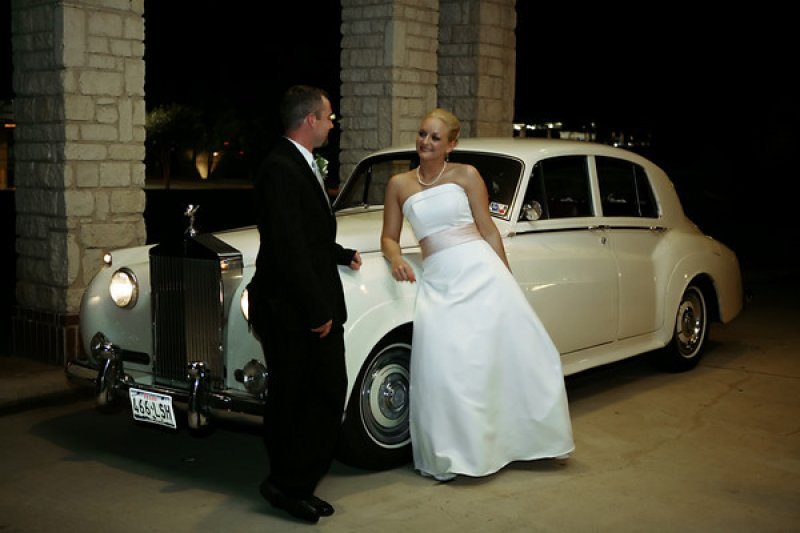The J. P. Blatchley design was a major change from the pre-war models and the highly derivative Silver Dawn.

All Silver Cloud III shared a

Rolls Royce Silver Cloud
The chassis was a simple steel box section, welded together and very rigid. Construction retained the traditional split between chassis and body, which facilitated the provision of special bodied versions though in practice the overwhelming majority of cars were delivered with the standard steel body shell, produced by Pressed Steel, and employing light weight aluminium based alloy for the doors, bonnet/hood and boot/trunk lid. The car was 5.38 m (212 in) long, 1.90 m (75 in) wide, and massed 1.95 tonnes. The engine was a 155 hp / 4000 rpm 4.9 L six-cylinder unit with inlet over exhaust valves: twin SU carburettors were added in September 1957. The standard transmission was a four-speed automatic.

mm. Rolls
Brakes were hydraulic and assisted by the Rolls-Royce mechanical servo with 11 in (279 mm) drums and suspension was independent coils at the front and semi-elliptic springs at the rear. Twin brake master cylinders were incorporated from April 1956.

wedding car. Picture
A long-wheelbase version, lengthened by 4 in (102 mm), was also made available in September 1957, outwardly very similar to the existing car, but offering improved leg space for rear-seat passengers.

The Rolls Royce Silver Cloud

interior view of Rolls-Royce
The British Motor magazine tested a standard-wheelbase factory-bodied Series I in 1956 recording a top speed of 102.9 mph (165.6 km/h) and acceleration from 0-60 mph (97 km/h) in 13.5 seconds and a fuel consumption of 14.5 miles per imperial gallon (19.5 L/100 km; 12.1 mpg-US). The test car cost £5078 including taxes.

1964 Rolls-Royce H.J. Mulliner

1958 Rolls Royce Silver Cloud

1964 Rolls-Royce Silver Cloud
The Silver Cloud II was introduced in 1959. Little changed externally but it now had a 6.2 L V8 engine, which pushed the weight to 2.11 tonnes. Performance was greatly improved and top speed was raised to 183 km/h (114 mph), but the main improvements were in acceleration and torque. Power steering became standard. Electrically operated windows were now available as an option.

Rolls Royse Silver Cloud

Rolls Royce Silver Cloud
Although the improved performance of the new car was welcomed, commentators of the time noted that the V8-engined Silver Cloud II was neither as quiet nor as smooth as the straight-six-cylinder-engined Silver Cloud I, despite the new engine's hydraulic tappet operation. The new wet-linered V8 was also a little cramped in an engine bay intended originally for a narrower unit: in order to change the sparking plugs it was necessary to remove the front wheel on the car's right side. There seems to have been a problem with crankshaft breakages in the earlier V8s: this was blamed on lack of lubrication to the bearings.

1958 White Rolls Royce Silver

Rolls Royce Silver Shadow

Rolls Royce Silver Cloud III

Rolls-Royce Silver Cloud

Rolls Royce Silver Cloud III

All Silver Cloud III shared a

Rolls Royce Silver Cloud
The chassis was a simple steel box section, welded together and very rigid. Construction retained the traditional split between chassis and body, which facilitated the provision of special bodied versions though in practice the overwhelming majority of cars were delivered with the standard steel body shell, produced by Pressed Steel, and employing light weight aluminium based alloy for the doors, bonnet/hood and boot/trunk lid. The car was 5.38 m (212 in) long, 1.90 m (75 in) wide, and massed 1.95 tonnes. The engine was a 155 hp / 4000 rpm 4.9 L six-cylinder unit with inlet over exhaust valves: twin SU carburettors were added in September 1957. The standard transmission was a four-speed automatic.

mm. Rolls
Brakes were hydraulic and assisted by the Rolls-Royce mechanical servo with 11 in (279 mm) drums and suspension was independent coils at the front and semi-elliptic springs at the rear. Twin brake master cylinders were incorporated from April 1956.

wedding car. Picture
A long-wheelbase version, lengthened by 4 in (102 mm), was also made available in September 1957, outwardly very similar to the existing car, but offering improved leg space for rear-seat passengers.

The Rolls Royce Silver Cloud

interior view of Rolls-Royce
The British Motor magazine tested a standard-wheelbase factory-bodied Series I in 1956 recording a top speed of 102.9 mph (165.6 km/h) and acceleration from 0-60 mph (97 km/h) in 13.5 seconds and a fuel consumption of 14.5 miles per imperial gallon (19.5 L/100 km; 12.1 mpg-US). The test car cost £5078 including taxes.

1964 Rolls-Royce H.J. Mulliner

1958 Rolls Royce Silver Cloud

1964 Rolls-Royce Silver Cloud
The Silver Cloud II was introduced in 1959. Little changed externally but it now had a 6.2 L V8 engine, which pushed the weight to 2.11 tonnes. Performance was greatly improved and top speed was raised to 183 km/h (114 mph), but the main improvements were in acceleration and torque. Power steering became standard. Electrically operated windows were now available as an option.

Rolls Royse Silver Cloud

Rolls Royce Silver Cloud
Although the improved performance of the new car was welcomed, commentators of the time noted that the V8-engined Silver Cloud II was neither as quiet nor as smooth as the straight-six-cylinder-engined Silver Cloud I, despite the new engine's hydraulic tappet operation. The new wet-linered V8 was also a little cramped in an engine bay intended originally for a narrower unit: in order to change the sparking plugs it was necessary to remove the front wheel on the car's right side. There seems to have been a problem with crankshaft breakages in the earlier V8s: this was blamed on lack of lubrication to the bearings.

1958 White Rolls Royce Silver

Rolls Royce Silver Shadow

Rolls Royce Silver Cloud III

Rolls-Royce Silver Cloud

Rolls Royce Silver Cloud III
No comments:
Post a Comment